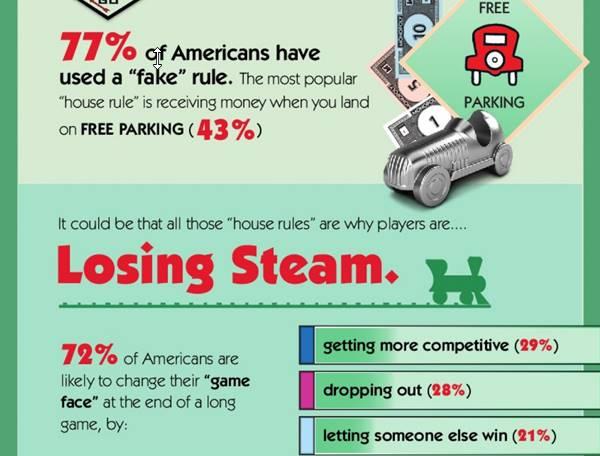Excel at Monopoly #6: House Rules
9 November 2016
This blog was inspired by a reader who had saw the Monopoly blog series in our monthly newsletter. He asked the question – what rules did I include in our simulation? Rewards on rolling double 1s (snake eyes) or double 6s? Or the absolute basic, purest rules?
For the simulations, I used the basic rules that come in the game. If you roll doubles, roll again; third time in a row and you go directly to Jail, do not pass Go!. However, it raises an important point about the rules that turn it from being a relatively competitive game that can be wrapped up in 1-2 hours, into a family nightmare that never finishes.
- Here are some clarifications of rules – some of these are straight out of the box, and others are points that are made that are contrary to the ‘common’ way the game is played.
- If you pay Income Tax, Super / Luxury Tax, Jail fees or any other fees, they do not go into a pot to be distributed to the next person who lands on Free Parking
- If you land on Go!, you do not get an extra $200
- You can run out of houses – if all the houses in the box have been allocated to properties, then no new houses can be constructed until someone sells a house
- If you roll double anything, you don’t get a special payout from the bank
- No loans are allowed from the bank, other than mortgages on your property (the bank in Monopoly doesn’t do unsecured lending!).

The first two points are particularly important. The whole game is balanced to ensure that it’s not likely that cash will build up and accumulate over time. Creating rules that result in people earning additional cash for doing nothing more than simply existing in the game will mean that the longer you play, the less likely you will be to succeed at bankrupting other players.
Let’s look at the probabilities.
Income
Suppose it takes an average of 6 turns to pass Go!, assuming that an average roll is a 7, and that there are 40 squares on the board. There are also 2 Chance cards and 8 Community Chest cards that will give you cash. This gives us:
- 200 / 6 = $33 per turn average from passing Go
- $0.93 from Chance cards, being the expected value each turn of drawing either the +$50 or +$150 cards.
- $8.93 from Community Chest cards, being the expected value each turn
Total income: ~$43 per turn.
Expenses
There are a range of expenses. We can pay $200 for landing on Income Tax, or $100 for landing on Super Tax. There are also some negative costs associated with Chance cards and Community Chest cards, with a large segment falling into the Street Repairs (25/40 per house and 100/115 per hotel respectively). If there are 32 houses and 12 hotels available, then in a typical 4 player game, the average player will have 8 houses and 3 hotels, which would cost $500 if you land on Chance, and $665 if you land on Community Chest. There is also a payment from exiting Jail. This yields:
- 200 * 2.31% = $4.62 average from landing on Income Tax
- 100 * 2.16% = $2.16 average from landing on Luxury Tax
- $3.57 from Chance cards
- $4.55 from Community Chest cards
- $3.50 average from leaving Jail
Total expenses: ~$16.50 per turn.
As such, on average, you will gain $26.50 from the bank, or around $100 every 4 turns. This is why it seems like games tend to go on forever – if properties are relatively evenly balanced, at some point, the passive income you get from staying in the game will result in strong enough cash balance to remain safe from bankruptcy. All it would take is a $26.50 imbalance in the expected value of the property owned by players in order to slowly send players into a spiral of debt and eventual bankruptcy.
House rules
Let’s look at the impact from some of the house rules:
- If taxes and fees go into the Free Parking pot, this removes expenses from the game (because the money will stay in circulation, and not be returned from the bank), resulting in a net increase of $16.50 per turn in income
- The probability of landing on Go! is 3.06%, multiplied by a bonus $200 is a net increase of around $6 per turn
- Paying out a reward for rolling double 1s (some Google research tells me a common rule is to pay $1000) – multiplied by a 2.78% probability gives you a net increase of $28 per turn.
The net result of these changes is an increase of around $50 per turn, which is greater than the natural income in the game, and results in triple the net gain from the bank if the game were played using just the official rules. This means that the property owned needs to be far more ‘unfair’ for the one player to slowly emerge above the others, as the expected value difference for one player to start losing money now needs to be at least $76.50 per turn.
So if you want to start playing a game of Monopoly over Thanksgiving, and hope to finish sometime before Christmas rolls around, the easiest way is to simply play by the rules – the official ones, that is!

